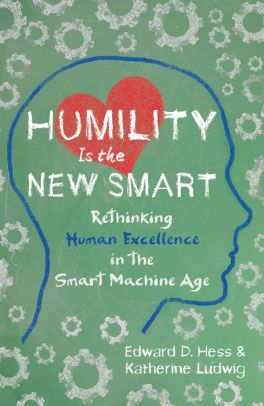Humility Is the New Smart – Edward D. Hess, Katherine Ludwig

To manage and lead a team, you need to meditate so that you dissolve your ego. Buddhism for the corporate world.
Smart Machine Age
Society is on the verge of a technological tsunami. Artificial intelligence, the Internet of Things, virtual reality, robotics, nanotechnology, deep learning, human brain mapping, and biomedical, genetic, and cyborg engineering advances will change the way most of us live and work.
This Smart Machine Age (SMA) has the potential to be as disruptive and transformative for us as the Agricultural Age and Industrial Revolution were for them.
The smart machine age: a new game requires new rules
Operational excellence may become almost entirely technology-driven in the Smart Machine Age (SMA), making human innovation the key to value creation.
Organizations will require their employees to be hyper-learners capable of adapting to rapidly changing environments.
New Smart is a measure of what you know rather than how much you know.
- The extent to which you think, listen, collaborate, and learn.
- How good are you at “not knowing” and disassociating your beliefs (not values) from your ego?
- How good are you at experimenting with new ideas and methods to achieve your goals and learning from those experiments?
The root of Humility
In Western societies, particularly in the United States, humility is rarely associated with intellectual aptitude or professional success.
Our understanding of Humility is based on our research into it as a philosophical, intellectual, and psychological construct. Humility is defined as an open-minded and selfless attitude toward oneself.
In the pursuit of human excellence, this allows one to embrace the world as it “is.”
Get ready for the next ride
The American worker has been outsourced, off-shored, and automated on many factory floors and in many routine tasks over the last few decades. Following that will be broader and more comprehensive automation, which will likely affect many more workers, including many professionals.
While automation has been taking place for decades, technology is now starting to replace knowledge workers such as accountants, business managers, doctors, lawyers, journalists, researchers, architects, higher-education teachers, and consultants.
The American Dream
Smart technologies will pervade and change many aspects of our professional and personal lives, challenging our fundamental beliefs about success, opportunity, and the American Dream in many ways. The most recent research indicates that technology will replace 47 percent of US jobs or displace up to eighty million US workers within the next ten to twenty years.

